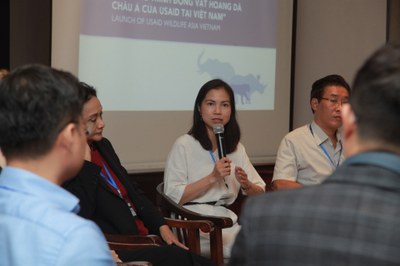Vietnamese Woman Champions wildlife protection through corporate social responsibility
How did you start working in counter wildlife trafficking?
I began supporting counter wildlife trafficking efforts after meeting TRAFFIC in 2015 to discuss collaboration through the Chi Initiative. The meeting made me realize the importance of fostering cooperation in the fight against illegal wildlife trade and consumption, as well as the need to enhance management capacity of Vietnamese enterprises to support this process. TRAFFIC and VCCI signed an MOU in 2015 and I have since been the main focal point for this partnership. The agreement has formed the basis for VCCI to spearhead efforts aimed at ending the illegal trade and consumption of wildlife particularly within Vietnam private sector. This year I am excited to welcome USAID Wildlife Asia as part of the Chi Initiative.
Why do you think the business sector should care about wildlife trafficking?
Vietnamese businesses are entering a new stage of economic integration. This will open the door to millions of potential new consumers and bring with its competition for higher standards of business. It is thus vital for enterprises in Vietnam to integrate policies that are socially and environmentally responsible. Wildlife protection is increasingly becoming an important theme for CSR programs. With many species under threat, the business community can make a great deal of difference by taking a stance against the illegal wildlife trade. In this way, wildlife-focused CSR activities benefit both the species they work to protect and the companies that implement them.
What can you do to reduce consumer demand for wildlife products in Vietnam?
I work with the Vietnamese business community daily, so I understand the needs of entrepreneurs and how to engage them in our campaign. With a network of more than 150,000 members, 300 trainers and 500 partners, VCCI has the capacity to effectively and positively shift behavior among the business community with regards to demand for illegal wildlife and their products. We believe that every business and every individual has the potential to be a role model in addressing this global issue.
What has been done to counter wildlife trafficking?
Since 2015, we have conducted three Training of Trainer Workshops for VCCI master trainers involved in fostering the adoption of wildlife protection into CSR policies throughout the country. The trainers were empowered to identify influential members of their communities and invite them to become key opinion leaders, entrepreneurs and businesspeople who not only abstain from consuming threatened wildlife, but also actively speak out against practices that harm biodiversity. To date, the trainers have embedded Chi-themed messaging in more than 350 echo trainings, exposing more than 20,000 businesspeople to Chi-themed messaging in 45 provinces and cities across the country.
How has the Chi Initiative been useful for you?
Supporting sustainable business development is one of our main objectives. To this end, the Chi Initiative has provided useful tools and case studies, which in turn have helped support the integration of the Chi Initiative. This has made our activities more practical, diverse and also allows them to be tailored to different business sectors.
What qualifications do you think women bring to reducing consumer demand for wildlife?
In Vietnam, about a quarter of private businesses are owned by women and 27 percent of Vietnam’s 4.5 million household businesses are managed by women. Women tend to have better relations with employees, customers and suppliers than men do. Besides being entrepreneurs, women are wives, mothers and sisters. They take care of the family, so their advice and guidance have a greater impact on family members.
How can we ensure greater roles for women in countering wildlife trafficking?
A network of businesswomen would be an ideal way for women to share best practices, success factors and lessons learned when implementing activities to protect endangered species. In this way, we can protect wildlife more effectively. We should design suitable, women-oriented initiatives/activities to attract more women to the fight against wildlife crime.
What has been the proudest moment in your countering wildlife trafficking work?
I am always proud when my contributions to business development are appreciated. I was particularly proud when a business person visited my office to tell me he had obtained good results from advice I had given him during a training course. I am also proud to be a champion of the Chi Initiative, which contributes to biodiversity conservation and sustainable development.


